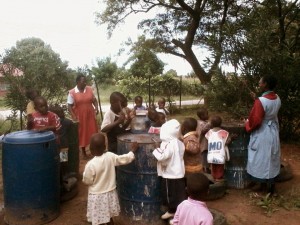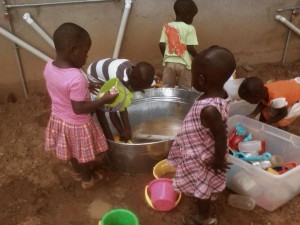It is important that all children receive an education. At MRCH most of the children go to local schools, which must be paid for. FoMRCH pays school fees to local schools (and some children receive external sponsorship to go away to boarding schools to do O and A level courses). All children must have school uniform and shoes to attend.
Please see our Newsletters and Photos for updates on all the activities the Friends undertake at the Home and for updates from the Home itself.
At the Home the children can also learn tailoring, carpentry and basic computer skills. Each family unit has it’s own garden in which the children learn to grow vegetables and then learn to cook them in their own kitchen. They may learn to look after rabbits, guinea pigs, goats and chickens to sell or eat.
Who made me where I am? by Trabby
“…The Home also taught some skills, which are lifetime skills like gardening, hospitality, computing, pig-rearing and fowl-rearing. Above all, Matthew Rusike introduced me to God where I can surrender the problems which are difficult for the Home to solve. Therefore Matthew Rusike is my parent.”
Motivational groups
The National Director, the nurse, other staff members, an HIV/Aids expert, and local business leaders all speak on a regular basis to the 12+ children about life skills, keeping healthy, diet, sexual health, rights and careers guidance. The staff try very hard to widen the children’s horizons beyond the confines of the Home and school but shortage of vehicles makes this very difficult.
MRCH Secondary School
A study group was registered by MRCH in the 1980s as a community resource to help secondary age children with their homework. In 2007 it was formalised into a small secondary school for children from the local community outreach project aged 13-16, whose families couldn’t afford to pay the full fees of secondary education. In 2009, 6 qualified teachers (with degrees and some studying for masters degrees) joined the staff at MRCH. The vision for the future was to transform it into a school where more subjects would be available and it could become an official examination centre for O and A level exams.
To apply for school status the building was refurbished, new toilets installed, 3 new classrooms with storerooms built and new furniture bought for them. All this was made possible by generous groups like the Liverpool MWiB in the UK raising several thousand pounds, money from FoMRCH and gifts in kind from local business and trades people and volunteers. The school was officially registered with the Department of Education in 2013 and UNICEF donated some books for the library.
In 2011, 250 teenagers from the local community were registered at the school.
In 2014 Barclays Bank donated a security door with a Chubb lock so that the school could qualify as a National Examination centre. The old classrooms were painted and new uniforms were made. In 2015 a generous UK donor sent the money for all the sports teams to have sports strips which they wear proudly when playing against other schools and clubs. Money was also dontated for some new Zimbabwean text books but many more are needed for all subjects.
There are still many needs for the school as one teacher said:
“We desperately need [money for] text books for the Zimbabwe curriculum and English novels for extra reading” Teacher
In 2016 a generous UK donor sent money for all the sports teams to have sports strips which they wear proudly when playing against other schools.
Some new Zimbabwean textbooks were bought but many more are needed for all subjects.
In 2016 the school became recognised as an official examination centre for external O and A level examinations.
The school is still for children and young people from the local community as the residential children attend locals schools off site. This is to prevent them becoming too institutionalised. The MRCH teachers’ salaries are still not paid by the government but out of the school fees paid by the students and MRCH funds.
From 2016 to 2018 9 local community students who had worked hard and done well in their O level exams had been personally sponsored by UK donors to study A level courses for 2 years. A couple of notes of thanks follow:
FROM DUST TO THIS LEVEL!
What an amazing support I received from Matthew Rusike Children’s Home Community Based Childcare Programme. I was identified from our community by Matthew Rusike Children’s Home who supported my education from grade five up to “A” level in 2019.
Surprisingly, “A” level results are out and I have 10 points. Thank you very much for all your support I got in order for me to reach this level. [Support by UK sponsors]
My goal is to go for Tertiary Education to study Business Management and have a professional qualification to be marketable in Industries all over the world.
As it is, I am standing on one foot, but once I have a professional qualification I can be stable with both feet on the ground. Once again, thank you wholeheartedly for raising me from dust to this level.
A level – student 3
A JOURNEY OF MERCIES
It was not easy to be where I am. Thanks a lot to Matthew Rusike Children’s Home through their Community Childcare Programme on which I was enrolled as a child in need of care.
I was assisted to go back to school from grade 4 to form 6 last year. I received educational support, food, toiletries and social counseling. I am proud to come up with 8 points. Thank you sincerely for putting your hands together.
My desire is to be a social worker and to be able to help vulnerable members to understand that they have all the strengths to improve themselves. My dreams can only come true if I go to university. I thank you honestly those who helped me to achieve 8 points. (UK sponsors)
A level – student 2
The college is performing satisfactorily. In 2018 the enrolment stands at 378 but we expect this to increase to almost 400 in the second term as they are still enrolling for A levels.
The college has 12 teachers and offers 12 O level subjects and 9 A level subjects. These include practical subjects like horticulture and garment making as well as the usual academic subjects.
There is a definite need for more funds for infrastructure, textbooks and other learning materials in line with the new curriculum and growing enrolment.
The MRCH college now has an enrolment of over 450 students from the local community and now is also a national examination centre.
The school is open to vulnerable children and young people from the local community who pay a reduced fee to attend. MRCH and students’ fees pay the teachers’ salaries, not the government.
The MRCH residential children attend local schools off site so that they meet children and families from the local community.
With effect from 1 December 2020, Matthew Rusike College will now operate as a stand-alone entity with a substantive Board and a new management led by the Principal, upon approval by Conference.
The Early Childhood Development Centre (ECD)
The one room crèche has been extended to include 3 classrooms, kitchen and toilet and washing area. It opened in 2011 with 54 children divided into 2 classes of 3-4 year olds and 4-5 year olds. Most of the children are part of the community outreach project in Epworth, the rest live at the home and include a small number of children of MRCH staff. When the buildings are all completed they hope to have around 100 children and another teacher
 To encourage sustainability, the ECD has been completely fenced and these youngest children help to rear rabbits, guinea pigs and goats for sale and food. They are now also growing their own vegetables.
To encourage sustainability, the ECD has been completely fenced and these youngest children help to rear rabbits, guinea pigs and goats for sale and food. They are now also growing their own vegetables.
Shelley Cooling a Mission Partner through the British Methodist Church worked at the Home for an eight month period helping to set up the new extended ECD. She wrote regular newsletters for us. Shelley was also part of the team providing support and training for staff across the national early years projects. The intention was to create understanding of the power of play as therapy and to develop relationships with the children that encourage emotional well being and skills for the future.
Children’s Council
The National Director (Astonishment Mapurisa) meets this group regularly. It is an opportunity for children’s concerns and opinions to be aired.
